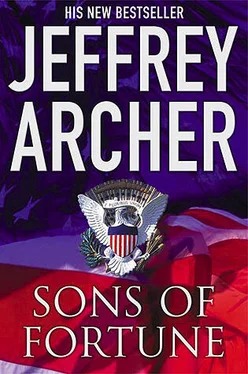Fletcher rose from his place and, looking directly at the judge, said, ‘No thank you, your honour, it is not my intention to make an opening statement.’
Fletcher and Nat sat in silence looking directly in front of them amidst the pandemonium that broke out in the courtroom. The judge banged his gavel several times, trying to bring the proceedings back to order. Fletcher glanced across at the state attorney s table, to see Richard Ebden, head bowed, in a huddle with his prosecution team. The judge tried to hide a smile once he realized what a shrewd tactical move defence counsel had made; it had thrown the state’s team into disarray. He turned his attention back to the prosecution.
‘Mr Ebden, that being the case, perhaps you’d like to call your first witness?’ he said matter-of-factly.
Ebden rose, not quite as confidently now that he’d worked out what Fletcher was up to. ‘Your honour, I would in these unusual circumstances seek an adjournment.’
‘Objection, your honour,’ cried Fletcher, rising quickly from his place. ‘The state has had several months to prepare their case; are we now to understand they cannot even produce a single witness?’
‘Is that the case, Mr Ebden?’ asked the judge. ‘Are you unable to call your first witness?’
‘That is correct, your honour. Our first witness would have been Mr Don Culver, the chief of police, and we did not want to take him away from his important duties until it was entirely necessary.’
Fletcher was on his feet again. ‘But it is entirely necessary, your honour. He is the chief of police, and this is a murder trial, and I therefore ask that this case be dismissed on the grounds there is no police evidence available to place before the court.’
‘Nice try, Mr Davenport,’ said the judge, ‘but I won’t fall for it. Mr Ebden, I shall grant your request for an adjournment. I shall reconvene this court immediately after the lunch break, and if the chief of police is unable to be with us by then, I shall rule his evidence inadmissible.’ Ebden nodded, unable to hide his embarrassment.
‘All rise,’ said the clerk, as Judge Kravats glanced at the clock before leaving the courtroom.
‘First round to us, I think,’ remarked Tom, as the state’s team hurriedly left the courtroom.
‘Possibly,’ said Fletcher, ‘but we’ll need more than Pyrrhic victories to win the final battle.’
Nat hated the hanging around, and was back in his seat long before the lunch break was up. He looked across at the state’s table, to see Richard Ebden also in his place, knowing he wouldn’t make the same mistake a second time. But had he yet worked out why Fletcher had risked such a bold move? Fletcher had explained to Nat during the adjournment that he believed his only hope of winning the case was to undermine Rebecca Elliot’s evidence, and therefore he couldn’t afford to let her relax even for a moment. Following the judge’s warning, Ebden would now have to keep her waiting in the corridor, perhaps for days on end, before she was finally called.
Fletcher took his seat next to Nat only moments before the judge was due to reconvene. ‘The chief’s out there in the corridor storming up and down fuming, while Mrs Elliot is sitting alone in a corner biting her nails. I intend to keep that lady hanging around for several days,’ he added as the clerk called, ‘All rise, Judge Kravats presiding.’
‘Good afternoon,’ said the judge, and turning to the chief prosecutor added, ‘Do you have a witness for us, Mr Ebden?’
‘Yes, I do, your honour. The state calls Police Chief Don Culver.’
Nat watched as Don Culver took his place on the stand and repeated the oath. Something was wrong, but he couldn’t work out what it was. Then he saw the second and third fingers of Culver’s right hand twitching, and realized it was the first time he’d seen him without his trade-mark cigar.
‘Mr Culver, would you tell the jury your present rank?’
‘I’m the chief of police for the city of Hartford.’
‘And how long have you held that position?’
‘Just over fourteen years.’
‘And how long have you been a law enforcement officer?’
‘For the past thirty-six years.’
‘So it would be safe to say that you have a great deal of experience when it comes to homicide?’
‘I guess that’s right,’ the chief said.
‘And have you ever come into contact with the defendant?’
‘Yes, I have, on several occasions.’
‘He’s stealing some of my questions,’ Fletcher whispered to Nat, ‘but I haven’t yet worked out why.’
‘And had you formed an opinion of the man?’
‘Yes I had, he’s a decent law-abiding citizen, who, until he murdered...’
‘Objection, your honour,’ said Fletcher, rising from his place, ‘it is up to the jury to decide who murdered Mr Elliot, not the chief of police. We don’t live in a police state yet.’
‘Sustained,’ said the judge.
‘Well, all I can say,’ said the chief, ‘is that until all this happened, I would have voted for him.’ Laughter broke out in the court.
‘And after I’ve finished with the chief,’ whispered Fletcher, ‘he sure won’t be voting for me.’
‘Then you must have had some doubt in your mind that such an upstanding citizen was capable of murder?’
‘Not at all, Mr Ebden,’ said the chief. ‘Murderers aren’t run-of-the-mill criminals.’
‘Would you care to explain what you mean by that, chief?’
‘Sure will,’ said Culver. ‘The average murder is a domestic affair, usually within the family, and is often carried out by someone who not only has never committed a crime before, but probably never will again. Once they’re in custody, they are often easier to handle than a petty burglar.’
‘Do you feel Mr Cartwright falls into this category?’
‘Objection,’ said Fletcher from a seated position, ‘how can the chief possibly know the answer to that question?’
‘Because I’ve been dealing with murderers for the past thirty-six years,’ Don Culver responded.
‘Strike that from the record,’ said the judge. ‘Experience is all very well, but the jury must in the end deal only with the facts in this particular case.’
‘Then let’s move on to a question that does deal with fact in this particular case,’ said the state’s attorney. ‘How did you become involved in this case, Chief Culver?’
‘I took a call at my home from Mrs Elliot in the early hours of May 12th.’
‘She called you at home? Is she a personal acquaintance?’
‘No, but all candidates for public office are able to get in touch with me directly. They are often the subject of threats, real or imagined, and it was no secret that Mr Elliot had received several death threats since he’d declared for governor.’
‘When Mrs Elliot called you, did you record her exact words?’
‘You bet I did,’ said the chief. ‘She sounded hysterical, and was shouting. I remember I had to hold the phone away from my ear, in fact she woke my wife.’ A little laughter broke out in the court for a second time, and Culver waited until it had died down before he added, ‘I wrote down her exact words on a pad I keep next to the phone.’ He opened a notebook.
Fletcher was on his feet. ‘Is this admissible?’ he asked.
‘It was on the agreed list of prosecutions documents, your honour,’ Ebden intervened, ‘as I feel sure Mr Davenport is aware. He’s had weeks to consider its relevance, not to mention importance.’
The judge nodded to the chief. ‘Carry on,’ he said as Fletcher resumed his seat.
‘ “My husband has been shot in his study, please come as quickly as possible”,’ said the chief, reading from his notebook.
Читать дальше












